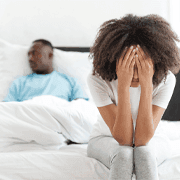Why am I bleeding after sex?
In This Article
Why am I bleeding after sex?
Indu
Updated on November 18, 2023
Medically verified by Dr. Arya
Fact checked by Dr. Sharon

Wellness
7 min read
Have you ever been stunned by the sight of blood, just after sex? Well, you are not alone. According to statistics, about 9% of menstruating women and 63% of postmenopausal women experience the same.
Sight of blood, just after sex is not what anyone wishes for. It could make the person experiencing it uncomfortable or ashamed. It could also hinder one from experiencing the maximum pleasure.
If it is light bleeding and happens only occasionally, you have nothing much to worry about.
But if you already went through menopause and are still experiencing this, or if you are concerned, you might need to visit an expert. Mykare Health can help you get connected with one.
Before jumping to conclusion, let us see some of the reasons that cause bleeding after sex.
Sources of Bleeding
Medical term for bleeding after sex is postcoital bleeding.
Normally, if you have not reached menopause yet, and the bleeding happens rarely, there is not much to worry about. In that case, bleeding could be from the cervix. In case you are still concerned, you should definitely seek professional opinion.
For those who reached menopause, source of bleeding could be:-
-
Cervix
-
Uterus
-
Labia
-
Urethra
Causes
Like we discussed earlier, bleeding could be because of some underlying medical conditions. Or it could be nothing more than just a spotting.
Let us see what are some of the causes for bleeding.
Vaginal Dryness
Medical term for vaginal dryness is vaginal atrophy.
It usually happens because of a shortage of oestrogen. And this could happen to people of any age. But it happens mostly after the menopause.
If vaginal dryness is severe, it could cause bleeding during intercourse.
Using lubrication could lessen the friction during sex, and thus bleeding. But if dryness is due to lack of oestrogen, you should seek medical help.
Vaginal dryness could be because of many other reasons too:-
-
Breastfeeding
-
Childbirth
-
Laundry detergents and chemicals used in feminine hygiene products
-
Certain medication
-
Having sex before being fully aroused
-
If ovaries are removed
-
A disease which reduces moisture generated by glands
-
Chemotherapy and radiation therapy
-
Douching
Infections
Bleeding could also be because of infection,which may result in inflammation of vaginal tissues. This inflammation could cause bleeding during sex.
Some of the infections are:-
- Pelvic Inflammatory Disease (PID)
This is an infection of reproductive organs in lower abdominal regions. This includes fallopian tubes, ovaries, cervix and uterus
- Sexually Transmitted Diseases (STI) such as Chlamydia
- Cervicitis: Inflammation of the cervix due to irritation or infections. This could cause bleeding during intercourse.
- Vulvovaginitis: Inflammation of vulva and vagina.
Tearing of Vagina
If you get a little adventurous in bed, especially if you are into rough sex, it could cause cuts or scrapes in vagina. It might sometimes cause bleeding.
Vaginal tearing might also be because of vaginal dryness or it could be tears caused by childbirth.
Cervical Ectropion
It occurs when the glandular cells that usually grow inside of the cervical canal expands into the outer part of the cervix.
This condition is not harmful and quite normal for many people.
Cervical ectropion is caused by high oestrogen levels.
This condition sometimes could affect your sex life, by causing bleeding. In that situation one should seek a doctor's treatment.
Cervical Polyps
A polyp looks like a chain pendant. They are growths on the openings of your cervix. This is caused by persistent inflammation or hormonal changes.
Polyps are usually not harmful.
Cervical polyps could sometimes cause bleeding during sexual intercourse. If bleeding is in an abnormal way,it could mean that cells are developing and in that case you need to seek medical treatment.
In that case a doctor might remove polyps and send it for testing inorder to make sure that the polyp is not harmful.
Excessive bleeding might require heat or cold therapy to stop the area from bleeding.
 7 min read
7 min readPhysical Fitness and Sexual Health: How Exercise Boosts Your Sexual Life
 7 min read
7 min readSexually Transmitted Diseases: Types, Symptoms, Treatment
 14 min read
14 min readHow to Avoid Pregnancy After Sex
Get a Callback Now
Cervical Cancer
Bleeding after sex (postcoital bleeding) or irregular vaginal bleeding is one of the first symptoms of cervical cancer.
According to statistics, about 11% of people with cervical cancer experience bleeding after sex.
Cervical cancer happens slowly over years,and they are preventable as long as you seek treatment on time.
In such cases,you need to seek advice and follow up your gynaecologist's instructions. He/she might refer you to a gynaecologist oncologist.
If the cells are cancerous they would recommend chemotherapy or radiation or surgery or a combination of three. If not,abnormal precancerous cells can be removed by simple treatment.
Uterine prolapse
Uterine prolapse can cause bleeding. It is a condition in which your uterus comes out of normal position.
Pelvic pain, abdominal pain, back pain and pain during sex are some of the symptoms of uterine prolapse.
Doctors usually recommend kegel exercises to strengthen the muscles in the area or weight loss, if the condition is minor.
If it is a serious condition, they usually perform a surgery to treat it or insert a ring to support the tissue.
Vaginal Precancer or cancer
It is cancer or precancer that starts in vagina. Precancer means cells that might or might not become cancerous.
Endometrial precancer or cancer
It is a precancer or cancer that starts in the uterus.
Genital sores
Genital sores can be formed due to sexually transmitted infections such as herpes (in genitals) and syphilis
Vaginal bleeding can also be caused by:-
- Not enough lubrication during sexual intercourse, results in friction, which leads to bleeding.
- Displacement of Intrauterine devices(IUD) which is used for birth control, can cause bleeding.
Open Communication with the partner
-
Open communication is essential for a healthy relationship, especially a healthy sexual relationship.
-
Talking with a partner gives you much needed emotional support and it builds trust between you and your partner.
-
It also helps in diminishing your worries and stress and it is the first step in seeking help.
Seeking Medical help
-
A doctor can definitely guide you in identifying the reason for post coital blood.
-
A professional can tell you whether your situation is something to be worried about or is it something benign.
-
He/she can accurately diagnose the underlying medical condition and helps you with the best possible treatment.
-
Diagnosing the problem in an early stage and seeking treatment on time would prevent your condition from getting worse.
Other Solutions
-
Make sure that you use enough lubrication while having sex, especially if it involves some adventurous side.
-
If sexually transmitted diseases are the reason for bleeding,inform your partner. And start using protection. Also, immediately seek medical help.
-
If you even have an ounce of doubt that bleeding is due to some serious underlying medical condition (such as cervical or uterus cancer), consult a doctor and start taking treatment.
-
If bleeding is caused by vaginal dryness, check whether it can be alleviated by simple lubrication. Sometimes you may need hormone replacement therapy.
How do you prevent postcoital blood?
-
If you have an active sex life,make sure to get regular checkups for sexually transmitted diseases.
-
As we discussed earlier, some STDs could result in bleeding after sex. And by checking regularly,you can avoid it to an extent.
-
Proper lubrication,especially water based lubrication can help you prevent friction. It is also helpful if the case is vaginal dryness.
-
Get regular gynaecological checkup. This will ensure that you don't have any serious underlying medical conditions which could result in postcoital blood.
-
A healthy lifestyle which includes a balanced diet, regular exercise and a healthy body weight. It can increase your reproductive and sexual health.
-
Healthy lifestyle also includes avoiding excessive smoking and consumption of alcohol
-
Communicate with your partner about any discomfort or pain you experience while having sex.
-
Discussing your sexual preferences and setting boundaries is the key to a healthy happy sexual life.
-
Besides all these, you should be aware of your body and its health condition.
-
Understand your menstrual cycle and fertility, and keep track of any discomfort or symptoms you are experiencing. This could be helpful while you are talking to a doctor.
Some menstruating women and more than half postmenopausal women experience bleeding after sex(postcoital blood)
This could be either nothing or there could be some serious underlying medical condition.
Women experiencing postcoital bleeding after menopause need to consult a gynaecologist.
Some of the reasons for postcoital blood includes,vaginal dryness, vaginal tear, infections, cervical ectropion, cervical polyps, uterine prolapse, genital sores and precancer or cancer in reproductive organs.
Sometimes you can sometimes avoid this simply by practising safe sex practices or using lubrication.
Open communication with your partner is the key to a healthy and happy sex life.
Keeping track of your reproductive and sexual life and problems related to it can be helpful in the long term.
Live a healthy lifestyle.This could be helpful to an extent in maintaining your overall health and reproductive health in particular.
Maintain regular checkups with gynaecologists. It could be helpful in early detection of any serious medical condition.



